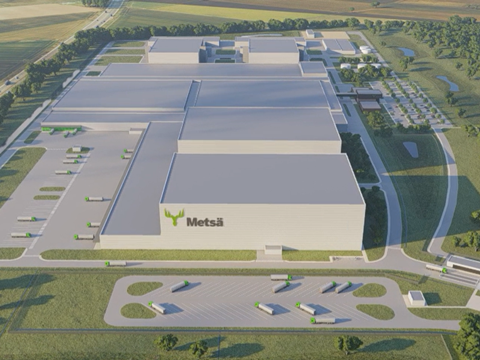
Metsä Group is planning a state-of-the-art tissue paper mill with an annual capacity of 240,000 tons – a move intended to reduce reliance on tissue product imports and contribute to a transition into fossil-free material raw materials.
Set to be built in Goole in the East Riding of Yorkshire, England, the facility is expected to supply both professionals and consumers in the UK and Irish markets. It anticipates the use of fresh fibre pulp as the main raw material, which will apparently be sourced from sustainably managed forests in the Nordics.
By investing in what is expected to be the largest tissue mill in the UK, Metsä Group believes it can reduce the amount of tissue products imported into the UK and Ireland every year. Instead, it hopes to boost uptake in locally produced tissue and increase the UK’s self-sufficiency in the sector by 30%, up to 85% by the time the mill is completed.
The mill is projected to be around 200 acres in size and will be built in several phases over the course of the next ten years, according to Metsä Group. Once it is operating at full capacity, it will reportedly create over 400 direct jobs at the facility and ‘thousands more’ across the supply chain and local economy.
Metsä Tissue plans to produce 1/5 of the UK’s whole tissue paper volumes. It foresees the Goole facility to contribute to its goals of manufacturing all its products from completely fossil fuel-free raw materials – and bringing fossil carbon emissions down to zero – by 2030.
“We are delighted to announce our plan to invest in a world-class production site in Goole,” said CEO Esa Kaikkonen. “This exciting investment would bring the UK and Finland together through combining the sustainable raw material of fresh wood fibres grown in the Nordics with world-class local production of quality tissues in the UK.”
In similar news, Valmet and Flootech intend to improve the environmental performance of the tissue, paper, and board industry with a partnership agreement to advance their water treatment processes. This is set to involve process water reuse, water recycling and fibre recovery, and more.
Achertäler Druckerei has also received a German Packaging Award for its wrapping tissue paper for premium products. Its crease-resistant hot-foil stamping is intended to unlock high-quality offset, flexo, and screen-printing processes, which is not thought to have been possible previously.
Mondi has also been actively investing in its facilities this year. In May, it dedicated €200 million to its paper mill in Duino, Italy, in pursuit of a 420,000-tonne recycled containerboard capacity; and, in June, it made a €125 million investment in its containerboard mill in Kuopio, Finland, in hopes of boosting its production capacity by 55,000 tonnes per annum.
If you liked this story, you might also enjoy:
How are the top brands progressing on packaging sustainability?
Sustainable Innovation Report 2024: Current trends and future priorities
Reuse vs. single use – which is better for the environment?
The ultimate guide to global plastic sustainability regulation














No comments yet